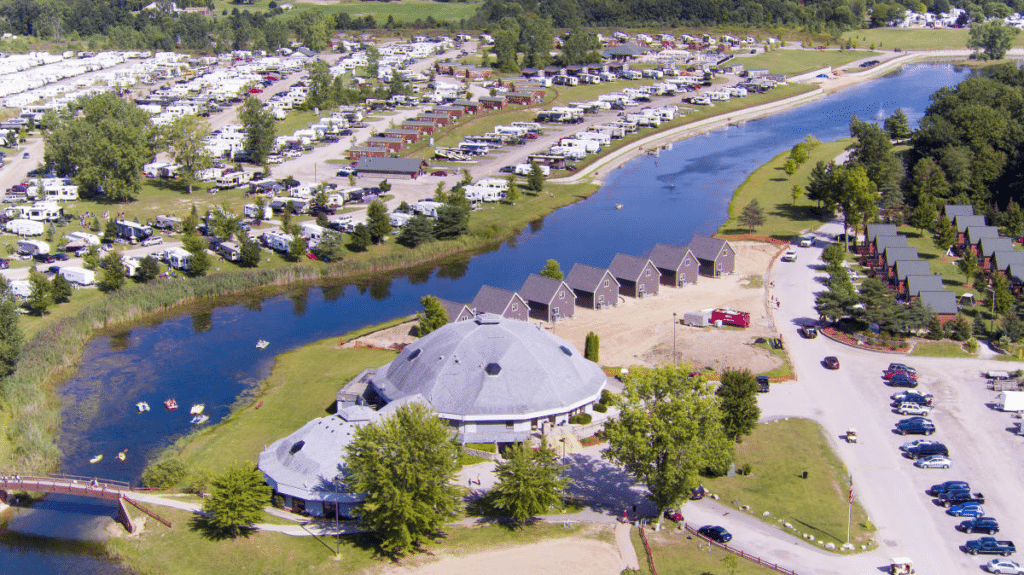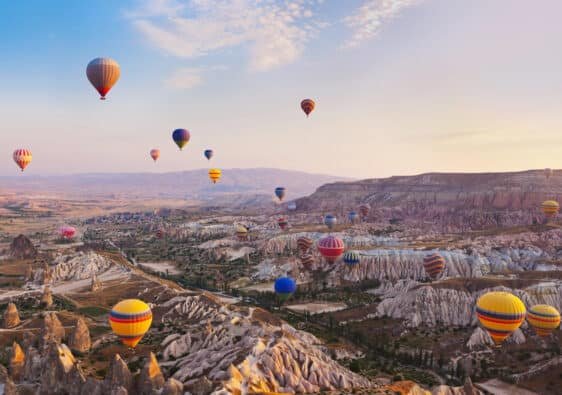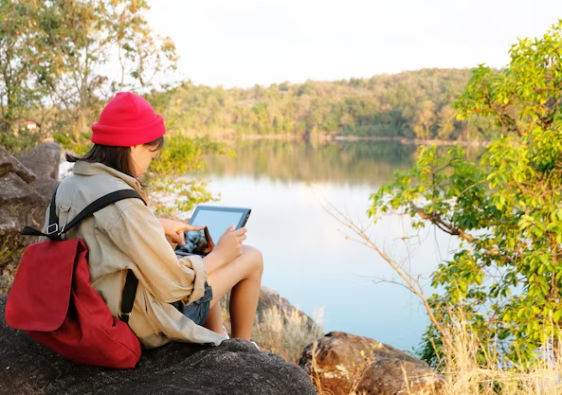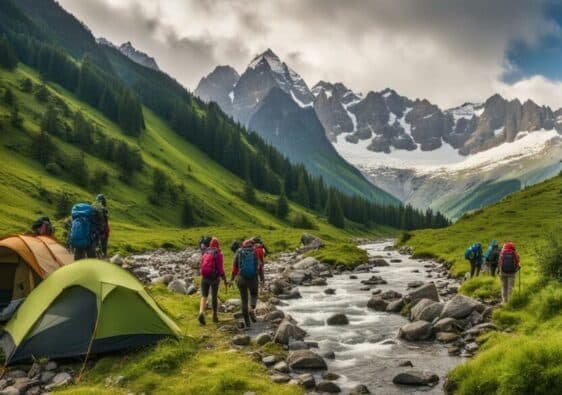Outdoor adventures hold a unique appeal that draws people from all walks of life. Whether you’re trekking through the wilderness, climbing a mountain, or kayaking down a river, outdoor activities have a way of making you feel alive. However, before you dive headfirst into the great outdoors, it’s important to consider the necessary preparation. Are you ready for the thrill of outdoor adventures?
In this article, we’ll explore the excitement, benefits, and essential preparation needed to ensure you are fully equipped for your next outdoor adventure. We’ll also answer some frequently asked questions and provide you with a conclusion to help you embark on your journey confidently. So, let’s dive into the world of outdoor exploration and discover how you can maximize your experience.
Key Takeaways:
- Outdoor adventures offer physical, mental, and emotional benefits.
- Preparation is essential for safety and enjoyment.
- Always research your destination, pack the right gear, and stay mindful of potential risks.
- Start with beginner-friendly activities and gradually challenge yourself as you gain experience.
- Adventure and personal growth go hand in hand—embrace the thrill of stepping out of your comfort zone!
What Makes Outdoor Adventures Thrilling?

Outdoor adventures are about more than just physical activity; they offer a sense of freedom and connection with nature that is difficult to replicate in everyday life. For many people, the thrill of being surrounded by natural beauty and challenging landscapes fuels their passion for outdoor pursuits. But what exactly makes these activities so thrilling?
Immersion in Nature
When you engage in outdoor adventures, you become immersed in nature’s splendor. The rustling of leaves, the sound of rushing rivers, the sight of distant mountain peaks—these experiences awaken the senses and create a deep bond with the natural world. Unlike urban environments where distractions are abundant, outdoor adventures allow you to fully focus on your surroundings and experience a sense of awe and wonder.
The Rush of Adrenaline
Many outdoor adventures are adrenaline-pumping activities that get your heart racing. Hiking steep trails, navigating rapids, or rock climbing require mental focus and physical endurance. This rush of adrenaline is a key part of why people are drawn to these activities. It’s an experience that challenges your body and mind, testing your limits while providing a sense of accomplishment once you succeed.
Overcoming Challenges
Outdoor adventures often involve overcoming obstacles, whether it’s scaling a rock face or navigating a rough trail. These challenges help build resilience and a sense of personal achievement. There’s something incredibly satisfying about pushing yourself beyond your comfort zone and conquering the unknown, which is a big part of what makes outdoor adventures so exhilarating.
Why Should You Pursue Outdoor Adventures?
Outdoor adventures provide more than just excitement; they offer a variety of physical, mental, and emotional benefits that make them an ideal choice for anyone seeking adventure and self-improvement.
Physical Health Benefits
Engaging in outdoor activities such as hiking, biking, kayaking, and climbing can improve your physical fitness. These activities engage multiple muscle groups, promote cardiovascular health, and improve endurance. Outdoor adventures also provide the perfect opportunity to stay active while enjoying breathtaking scenery.
Additionally, spending time outdoors can boost your immune system by exposing you to fresh air and sunlight, both of which are vital for overall health. Vitamin D, which is produced by the skin when exposed to sunlight, plays a critical role in bone health and immune function.
Mental Clarity and Stress Relief
One of the most profound benefits of outdoor adventures is the mental clarity they offer. Spending time in nature has been shown to reduce stress, anxiety, and depression. The sights and sounds of the natural world can have a calming effect on the mind, allowing you to escape from the hustle and bustle of everyday life.
Moreover, outdoor activities often require mindfulness, as you need to pay attention to your surroundings, your body’s movements, and your breathing. This heightened awareness can serve as a form of meditation, promoting a sense of calm and emotional balance.
Building Confidence and Self-Esteem
Outdoor adventures push you to confront your fears, take risks, and persevere in challenging situations. Whether it’s summiting a peak or learning a new skill, the process of overcoming these hurdles can boost your confidence. Achieving success in outdoor activities also fosters a sense of accomplishment and self-worth, which translates into other areas of life.
Strengthening Social Bonds
Many outdoor adventures are enjoyed with friends, family, or like-minded adventurers. Shared experiences create lasting memories and help build stronger connections. From camping trips to group hikes, these activities encourage collaboration and teamwork. The camaraderie that comes from tackling challenges together can strengthen relationships and create a sense of community.
How to Prepare for an Outdoor Adventure?

The thrill of outdoor adventures is undoubtedly exhilarating, but preparation is key to ensuring you stay safe and have an enjoyable experience. Let’s explore the steps you should take to adequately prepare for your adventure in the wilderness.
1. Choose the Right Adventure for Your Skill Level
Before setting out, it’s essential to select an activity that matches your skill level and experience. For beginners, activities like hiking or camping may be the best place to start, as they require minimal technical knowledge and equipment. On the other hand, more advanced activities such as mountaineering or white-water rafting may require specialized training and gear.
If you’re new to outdoor adventures, consider taking a class or hiring a guide who can teach you the basics and help you stay safe during the experience.
2. Research the Destination
Whether you’re going for a hike, a camping trip, or a kayaking expedition, it’s crucial to research the area you’ll be visiting. Know the weather conditions, terrain, wildlife, and any potential hazards that could arise. Some remote areas may not have reliable cell service, so it’s important to be prepared for emergencies and have a plan in place.
3. Pack the Right Gear
Packing the right gear is critical to a successful outdoor adventure. Your equipment will depend on the type of activity you’re participating in, but certain essentials apply to most outdoor activities:
- Clothing: Dress in layers so you can easily adjust to changing weather conditions. Be sure to wear moisture-wicking fabrics and durable, comfortable footwear.
- Navigation Tools: Bring a map, compass, or GPS device to help you navigate unfamiliar terrain.
- Safety Gear: Depending on the activity, this could include helmets, harnesses, first-aid kits, and a whistle.
- Food and Water: Carry enough water to stay hydrated and pack energy-boosting snacks, such as trail mix or energy bars.
- Shelter: If you’re camping, ensure you have a high-quality tent and sleeping bag to keep you comfortable through the night.
4. Prepare Physically
Some outdoor adventures can be physically demanding, so it’s important to prepare your body. Regular exercise and conditioning will help you build strength and endurance, which will make your adventure more enjoyable. Activities like hiking, running, swimming, or cycling can help improve your cardiovascular health and stamina.
5. Learn Outdoor Skills
Outdoor adventures require specific skills, depending on the activity. Consider taking a class to learn the basics of navigation, survival, or first-aid. Knowing how to build a fire, identify dangerous plants, or safely navigate through wilderness areas will increase your chances of success and safety during your adventure.
6. Stay Safe and Be Mindful
Safety should always be your top priority when venturing into the outdoors. Make sure someone knows your plans and expected return time. Carry a whistle, a flashlight, and a fully charged phone in case of emergencies. Practice Leave No Trace principles to minimize your environmental impact and respect nature.
The Mental Health Benefits of Outdoor Adventures

Outdoor adventures are not only about physical activity but also have profound mental health benefits. In recent years, research has highlighted the positive impact that spending time outdoors has on mental well-being. From reducing anxiety to promoting mindfulness, the great outdoors offers a natural remedy to stress and depression.
Being in nature has a calming effect on the mind, allowing individuals to disconnect from the pressures of daily life. The rhythmic sounds of flowing water, the rustling of trees, and the sheer beauty of natural landscapes foster a sense of peace and serenity. These moments of tranquility can help reduce the production of cortisol, the stress hormone, and promote relaxation.
Furthermore, outdoor activities that require concentration, such as hiking, rock climbing, or paddling, can serve as a form of active meditation. They help individuals focus on the present moment, shifting their attention away from worries or negative thoughts. This sense of mindfulness promotes a more balanced, positive outlook on life.
Exploring Different Types of Outdoor Adventures
Outdoor adventures encompass a wide range of activities, each with its own unique appeal and challenges. From leisurely strolls to high-intensity sports, there’s something for everyone. Whether you’re an adrenaline junkie or someone who prefers a more relaxed outdoor experience, the world of adventure offers endless possibilities.
For those seeking thrill and excitement, activities like rock climbing, bungee jumping, white-water rafting, or skydiving provide intense bursts of adrenaline. These types of adventures often push individuals to confront their fears and step outside of their comfort zones.
For a more serene experience, activities like hiking, bird watching, or stargazing allow participants to connect with nature without the need for physical exertion. These adventures offer time for reflection, relaxation, and appreciation of the beauty surrounding us.
Camping is another versatile outdoor activity that can be tailored to fit your adventure level. Whether you’re setting up camp in a remote wilderness or opting for a more luxurious glamping experience, camping offers a unique opportunity to escape modern life and reconnect with the natural world.
Sustainable Outdoor Adventures: How to Protect Nature While Enjoying It
While outdoor adventures are undoubtedly thrilling, it’s important to approach these activities with a sustainable mindset. As more people venture into the wilderness, preserving these natural spaces has become increasingly important to ensure that future generations can also enjoy the beauty of the outdoors.
The principle of “Leave No Trace” is central to sustainable outdoor adventuring. This set of guidelines encourages adventurers to minimize their impact on the environment by following simple rules such as packing out all trash, staying on established trails, and avoiding disturbing wildlife. By adopting these practices, outdoor enthusiasts can help protect delicate ecosystems and reduce their environmental footprint.
Additionally, eco-friendly gear choices—such as biodegradable soaps, reusable water bottles, and clothing made from sustainable materials—further contribute to minimizing environmental harm. Supporting outdoor brands that prioritize sustainability can also help promote the preservation of natural spaces while enjoying outdoor activities.
How Outdoor Adventures Foster a Sense of Community
Outdoor adventures often bring people together, creating strong social bonds and a sense of belonging. Whether you’re participating in group hikes, camping trips, or outdoor sports, these activities promote teamwork, cooperation, and camaraderie.
Shared outdoor experiences allow participants to connect with others in meaningful ways. The challenges faced during an outdoor adventure—such as navigating a difficult trail or setting up camp—foster a sense of mutual support. These shared goals and experiences help create lasting memories and strengthen friendships.
Moreover, outdoor adventures can also create a sense of community among like-minded individuals. Many outdoor groups, clubs, and organizations exist to bring together people who share a passion for exploration. These communities provide a supportive environment for people of all skill levels to enjoy outdoor activities and learn from one another.
Adventure Travel: The Rise of Outdoor Tourism
Adventure travel is becoming increasingly popular, as more people seek authentic experiences that immerse them in the natural world. Whether it’s trekking to Machu Picchu in Peru, hiking through the Swiss Alps, or going on a safari in Africa, outdoor tourism offers the opportunity to explore some of the world’s most breathtaking landscapes.
Adventure tourism is not just about physical activity—it’s about cultural exploration and self-discovery. Travelers who embark on adventure trips often seek to engage with local communities, learn about indigenous traditions, and experience the natural wonders of a region. This type of tourism encourages responsible travel and supports sustainable practices that protect both the environment and local cultures.
However, with the growth of adventure tourism comes the need for sustainable practices to ensure that popular destinations remain accessible and protected for future generations. Responsible travel involves respecting local cultures, supporting eco-friendly accommodations, and ensuring that activities do not disrupt fragile ecosystems.
The Evolution of Outdoor Gear: From Basic to High-Tech Equipment
Outdoor adventures often rely on the use of specialized gear that enhances the experience and ensures safety. Over the years, outdoor gear has evolved from basic tools and materials to high-tech equipment designed to optimize performance in extreme conditions.
For instance, modern tents are lighter, more durable, and easier to set up than ever before, thanks to advancements in materials such as lightweight aluminum and synthetic fabrics. Outdoor clothing has also become more sophisticated, with moisture-wicking fabrics, breathable membranes, and weather-resistant materials providing enhanced comfort in varying conditions.
Moreover, technology has made its way into outdoor adventures in the form of GPS devices, action cameras, drones, and portable solar chargers. These gadgets provide real-time navigation, documentation, and communication, allowing adventurers to explore more remote areas with greater confidence and safety.
Despite these technological advancements, many outdoor enthusiasts still value the simplicity of nature and choose to disconnect from devices while enjoying their adventures. Balancing the use of technology with a mindful appreciation for the natural world is key to ensuring that outdoor activities remain meaningful and immersive.
Outdoor Adventures for Families: Bonding in Nature
Outdoor adventures are a fantastic way for families to bond and create lasting memories. Whether it’s a weekend camping trip, a family hike, or a day at the beach, spending time outdoors allows families to connect in a way that indoor activities simply can’t match.
Outdoor activities teach valuable life skills such as teamwork, problem-solving, and resilience. Children, in particular, can benefit from outdoor adventures by developing physical coordination, an appreciation for nature, and an active lifestyle.
Moreover, outdoor adventures provide opportunities for families to disconnect from technology and focus on each other. The shared experiences of setting up camp, cooking over a fire, or exploring a new trail help strengthen family bonds and create unforgettable moments together.
Parents can introduce their children to a variety of outdoor activities based on their interests and age, from fishing and cycling to rock climbing and canoeing. Outdoor adventures can be tailored to suit all family members, ensuring that everyone can participate and enjoy the experience.
The Importance of Preparing for Outdoor Survival
Survival skills are essential for anyone engaging in outdoor adventures, particularly those venturing into remote or challenging environments. Knowing how to navigate, find food and water, build shelter, and stay safe in emergencies can mean the difference between life and death in the wilderness.
Basic survival knowledge includes understanding how to signal for help, building a fire, and administering first aid. More advanced skills might include wilderness navigation, knot tying, and the ability to recognize edible plants or identify signs of dangerous wildlife.
Taking survival courses, reading survival manuals, or practicing these skills in controlled environments can help adventurers feel more confident and prepared in the event of an emergency. Preparation is key to ensuring a safe and successful adventure, and it’s always better to be over-prepared than underprepared when venturing into the wild.
Read More:- What is Travel Health Insurance and Why Do You Need It?
Conclusion:
Outdoor adventures offer thrilling experiences that challenge the body, mind, and spirit. Whether you’re scaling a mountain, hiking through a forest, or paddling along a river, these activities provide not only physical benefits but also emotional and mental rewards. However, proper preparation is key to ensuring that your adventure is safe, enjoyable, and memorable.
With the right gear, skills, and mindset, you’ll be ready to tackle any challenge that comes your way. So, are you prepared for the thrill of outdoor adventures? If you’ve done your research, packed appropriately, and taken the time to train, you’re ready to embark on an unforgettable journey into the wild!
FAQs:-
1. What are some easy outdoor adventures for beginners?
Beginner-friendly outdoor adventures include hiking on well-marked trails, birdwatching, camping in designated campgrounds, or paddling on calm lakes or rivers. These activities are relatively simple and require minimal experience or special skills.
2. How can I stay safe during an outdoor adventure?
To stay safe, always inform someone of your plans, carry essential gear (such as a first-aid kit and navigation tools), and know how to respond to emergencies. It’s also important to monitor the weather and be prepared for any unexpected changes.
3. What should I do if I get lost while hiking?
If you get lost while hiking, remain calm and assess your situation. Stop, stay put, and try to retrace your steps. Use a map or compass to navigate and call for help if needed. It’s always better to wait for assistance than wander aimlessly.
4. How do I know which outdoor activities are right for me?
Consider your fitness level, experience, and interests when choosing an activity. Start with something manageable and gradually increase the challenge as your skills improve. Ask for recommendations from experienced adventurers or guides to help you decide.
5. How do I prepare for extreme outdoor adventures?
For extreme adventures like mountaineering or backcountry skiing, take specialized training and practice in controlled environments. Always carry advanced safety equipment, such as avalanche gear, and go with experienced guides if possible.
6. What gear do I need for camping?
Basic camping gear includes a tent, sleeping bag, stove or fire-starting materials, food and water, and clothing suited for various weather conditions. A headlamp or flashlight, a first-aid kit, and a multi-tool can also come in handy.
7. How do I prevent injury during outdoor adventures?
To prevent injury, warm up before activities, stay hydrated, use proper techniques for each activity, and wear appropriate clothing and footwear. Always know your limits and take breaks as needed.




